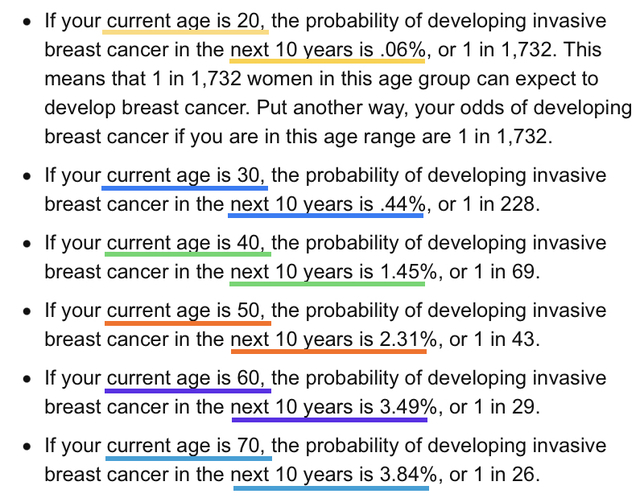How to understand risk level and best risk calculator to use
Hi , I am totally confused about what my risk for breast cancer is now at my age of 67 years and having discovered incidentally I have a BRCA2 mutation 3 years ago . When I reread the info my Genetic Counselor sent home with me I received the following stats- cumulative life risk of breast cancer-61-77% to age 80 My risk over next 5 years 8-10% and over next 10 years is 15- 19 % .
I wished I had studied statistics as I am struggling to interpret what this means now in terms of the 61-77% risk and what numbers should guide me whether a PBMX would be unnecessary due to possibly being low risk now. What have other people done in the over 60 age group and what was the most useful risk calculation to use that influenced screening vs prophylactic surgeries?
Comments
-
Charlierun,
I can't answer your question directly since I've tested negative for all the breast cancer genes. There is a lot of cancer in my family so I had the opportunity to participate in a clinical trial where I was tested for 151 cancer genes. The result was surprising - the only positive result I had was for a gene that confers a risk for cancers that have never shown up anywhere on either side of my family. Okay, didn't see that one coming. I do have a VUS for a gene that may be weakly related to some of the family cancers, but it's another gene in that group that is more concerning, and the variant I have of this less concerning gene at this point isn't thought to be cancer causing. But enough about me ;-)
What I can share is my understanding of breast cancer risk by age. Your risk is higher than average because of the BRCA mutation but I would think that the general principles of risk by age would apply.
Here is some information I found on the BCO information pages. Most of us have read that the lifetime breast cancer risk for the average woman is 12.4%. What this chart does is break that risk down into 10 year intervals.

If I added correctly, the total from the chart is 11.59%. This means that for those over age 80, a risk of 0.8% remains, bringing total lifetime risk (adding all 10 year periods together) to 12.4%.
You are 67. Looking at this chart and doing some rough math, the average 67 year old woman faces a 5.7% remaining lifetime risk. I simply added 3/10ths of the risk from the decade of one's 60s (about 1.05%), plus all of the risk from one's 70s (3.84%) and all of the risk from one's 80s (0.8%).
The information you've been given is for the next 10 years. Doing similar math, over the next 10 years, the average 67 year old faces a risk of about 3.8% (I'm rounding to a single decimal) whereas you've been told that your risk over the next 10 years is 15%-19%. So your risk is 4 to 5 times the risk of the average woman. Therefore if the average 67 year old has a remaining lifetime risk of 5.7%, this means that your remaining lifetime risk falls in the range of 23% to 28.5%.
Does that make sense? Does that help with your decision?
Can you run this by your MO or Genetic Counsellor to see of the logic and calculations make sense to them?
0 -
Hi Bessie, I am so incredibly appreciative of the time and effort you put into replying to my post. That was so helpful and I hope to chat with my Genetic Counselor this week and review my risk level with her. I always like to make my health care decisions on evidence based science and best practice standards but this BRCA2 mutation and what to do about it has been my greatest challenge so far. I also feel pressure to get it right( if one can) in terms of PBMX or not as two of my 3 children inherited the gene. I don’t discuss any of my angst about deciding what to do with them as I don’t want to cause them undue anxiety.
That is interesting about the number of cancer genes you were tested for in the trial , 151 genes! Who knew it could be that many!
Thank you Bessie once again and I hope you enjoy your day today.0